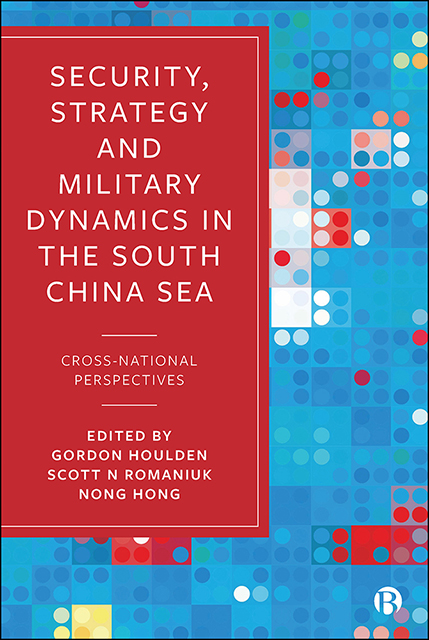Book contents
- Frontmatter
- Contents
- List of Tables
- Notes on Contributors
- Foreword
- Introduction: Strategic Challenges and Escalating Power Rivalry in the South China Sea
- 1 Between Competition and War: Complex Security Overlay and the South China Sea
- 2 The South China Sea as an Echo Chamber of Chinese Foreign and Security Policy
- Part I Claimants of the Contested South China Sea
- Part II Non-Claimants in Southeast Asia
- Part III Quadrilateral Security Dialogue States
- Part IV Non-Claimants in Europe and Eurasia
- Conclusion: Looking over the Horizon – Prospects for Settlement of the South China Sea Dispute?
- Index
9 - The South China Sea Dispute: Regional Integration, Status Ad Quem, and Singapore’s Position
Published online by Cambridge University Press: 13 April 2023
- Frontmatter
- Contents
- List of Tables
- Notes on Contributors
- Foreword
- Introduction: Strategic Challenges and Escalating Power Rivalry in the South China Sea
- 1 Between Competition and War: Complex Security Overlay and the South China Sea
- 2 The South China Sea as an Echo Chamber of Chinese Foreign and Security Policy
- Part I Claimants of the Contested South China Sea
- Part II Non-Claimants in Southeast Asia
- Part III Quadrilateral Security Dialogue States
- Part IV Non-Claimants in Europe and Eurasia
- Conclusion: Looking over the Horizon – Prospects for Settlement of the South China Sea Dispute?
- Index
Summary
Introduction
Some years have passed since the South China Sea (SCS) Arbitral Tribunal Award was issued in 2016. The atmosphere now is very different from the days when the region had been plagued by occasional maritime skirmishes and standoffs. Regional leaders are busy talking about economic integration and measures to boost inter-state and intra-regional trade exchanges, with a language characterized by development, stability, and common destiny. Yet, the contention of freedom of navigation and shadows of great-power wrestling have stirred up regional waters, sending a palpable reminder that the danger of inadvertent conflicts is that they may easily lapse into a serious, whole-scale confrontation. This has given the SCS issue an opportune redefinition, particularly in a context of seeing the irrepressible tensions escalating between China and the US. That intensification of the SCS issue can be deemed a process integral to China's development, and to the entailed tensions between China as a rising power and the US as an existential extra-regional power. In other words, the SCS issue, in and of itself, should always be considered in a broader context, seeing the competition of agendasetting power between China and the US. Therefore, territorial disputes in the maritime forefront are a prelude to this great-power wrestling in the macro aspect, and a reflection of the dual dilemma encountering regional claimants and countries in a micro sense. It is from this regionalizationregionalism perspective that how Singapore currently views the SCS issue should be evaluated.
This chapter addresses the SCS issue in the context of consistently advancing regional integration in Southeast Asia. In particular, Singapore's efforts and postures in steering the simmering SCS issue through this advancing regional integration under the shadow of intensifying great-power wrestling and regional terrorist attacks will be studied. In this vein, this chapter intends to view the SCS issue as an integral part of the reconfiguration of a transnational order in Southeast Asia, discussions of which can only be comprehensive when various aspects are factored into the deliberation. Up to the present day, it is fair to argue that this transnational order (and re-ordering) is mainly economic-oriented, while regionalization has been a major push force.
Regional integration in Southeast Asia: the promising economic aspect
- Type
- Chapter
- Information
- Security, Strategy, and Military Dynamics in the South China SeaCross-National Perspectives, pp. 179 - 192Publisher: Bristol University PressPrint publication year: 2021

